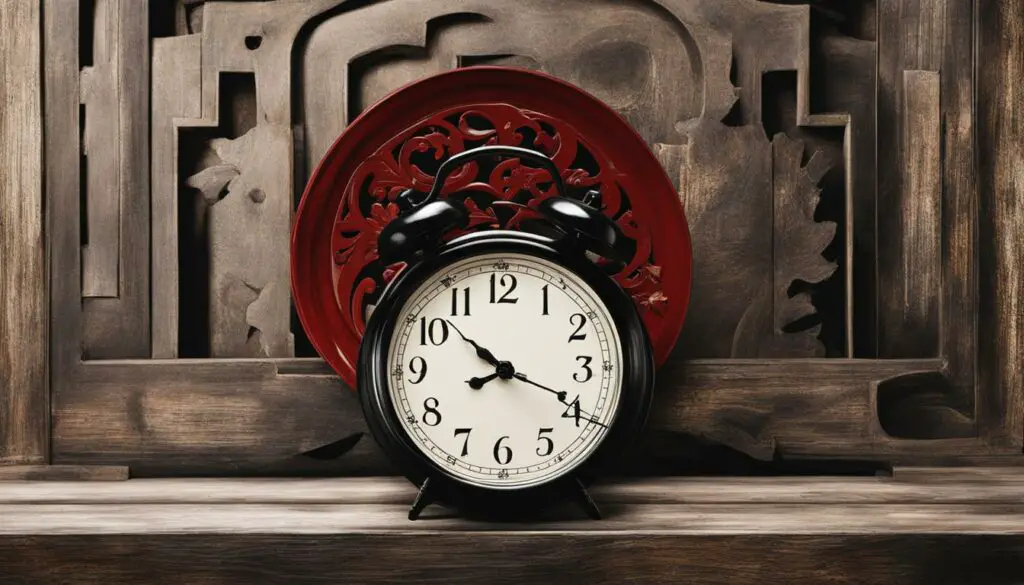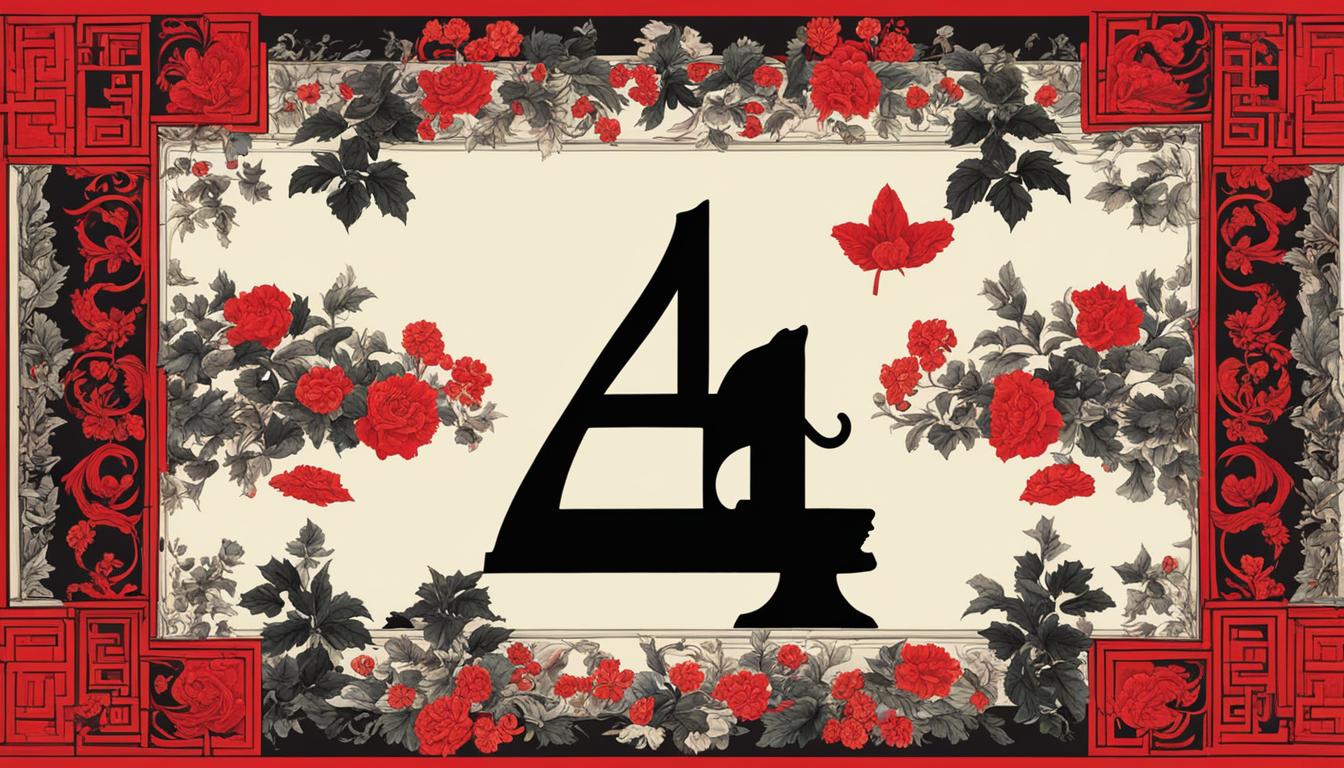Originally posted on October 28, 2023 @ 4:56 am
In Chinese culture, certain numbers have significant cultural meanings and superstitions attached to them. One of the most notorious of these numbers is 4. The number 4 is considered unlucky in Feng Shui due to its association with death and bad luck. But why is this number deemed so unlucky?
In this article, we will explore the reasons behind the negative connotations associated with the number 4 in Feng Shui. From understanding Feng Shui numerology to exploring the significance of numbers in Chinese culture, we will delve into the cultural beliefs and superstitions surrounding the number 4.
Discover how the pronunciation and homophonics of this number plays a role in Feng Shui beliefs, and learn about the various taboos and avoidance practices associated with it. We will also offer practical Feng Shui remedies and corrections, so that you can apply these principles effectively while respecting cultural beliefs.
Key Takeaways
- The number 4 is considered unlucky in Feng Shui due to its association with death and bad luck
- Numbers hold significant cultural meanings and superstitions in Chinese culture
- Understanding the balance of Yin and Yang energies is crucial to understanding Feng Shui beliefs
- There are various taboos and avoidance practices associated with the number 4 in Feng Shui
- Practical Feng Shui remedies and corrections can help mitigate the negative influences of the number 4
Understanding Feng Shui Numerology
In Feng Shui, every number holds symbolic significance. They are believed to have an influence on various aspects of life, including health, wealth, and relationships. Understanding Feng Shui numerology can provide valuable insights into the energy of your surroundings and the impact it has on your life.
The number 4 is one of the most widely known numbers in Feng Shui, and it symbolizes stability, practicality, and balance. Additionally, it is believed to represent the four seasons and four elements – earth, fire, water, and air. However, despite these positive associations, the number 4 is also considered unlucky in Chinese culture.

According to Feng Shui numerology, the number 4’s unlucky reputation is due to its pronunciation in the Chinese language. In Chinese, the number 4’s pronunciation is similar to the word for death, making it a homophone. This linguistic association has led to a cultural superstition that the number 4 is associated with death and misfortune, and hence, it is avoided whenever possible.
Interestingly, the number 4 is also associated with the heart chakra in spirituality and is believed to represent love and compassion. This contrast between the positive and negative associations of the number 4 highlights the complex nature of numerology in Feng Shui and how it is influenced by cultural beliefs and symbolism.
The Significance of Numbers in Chinese Culture
In Chinese culture, numbers are imbued with symbolic meaning and significance. Specific numbers are believed to bring good luck, while others are considered unlucky or ominous. Understanding the significance of numbers is essential to gaining insight into Chinese beliefs, customs, and traditions.
The Symbolism of Number 4
The number 4, or 四 (sì) in Chinese, is often associated with bad luck and negativity. One reason for this is its pronunciation, which sounds similar to the word for death, 死 (sǐ). This homophonic association has led to the number 4 being avoided or feared in Chinese culture.
Additionally, the four seasons, four directions, and four elements (earth, water, fire, and air) are considered complete and balanced in Western cultures. However, in Chinese culture, the number 5 is associated with balance due to the philosophical concept of Wu Xing, which includes the elements of wood, fire, earth, metal, and water. The number 4, therefore, is seen to disrupt this harmony and balance, making it an unlucky number in Chinese culture.
The Impact of Number 4 on Daily Life
The negative association with the number 4 is reflected in many aspects of Chinese daily life. For example, buildings often skip the fourth floor and jump from the third to the fifth floor, and many hospitals avoid assigning the number 4 to patient rooms. Similarly, gifts of four are rarely given and even numbers are preferred, as odd numbers are believed to bring good luck.
On the other hand, the number 8 is considered to be lucky in Chinese culture due to its resemblance to the word for prosperity, 发 (fā). This has led to the popularity of phone numbers and license plates containing the number 8, as well as the willingness to pay a premium for items with prices ending in 8.
The Significance of Numbers in Chinese Language
Numbers are not only important in Chinese culture but also in the language itself. Each number has a unique character, and these characters are often used in puns and wordplay. For example, the number 6, 六 (liù), sounds similar to the word for “flow” or “smooth,” so it is often associated with good luck and positivity.
Similarly, the number 9, 九 (jiǔ), sounds similar to the word for “long-lasting” or “eternity,” making it a popular number for weddings and other celebrations. The number 2, 二 (èr), sounds similar to the word for “love,” so it is often used on Valentine’s Day and in romantic contexts.

The Role of Numbers in Feng Shui
Numbers also play a significant role in the practice of Feng Shui, a traditional Chinese system of arranging objects and spaces for optimal energy flow and balance. The number 4 is considered to be inauspicious in Feng Shui and is believed to bring bad luck and negative energy.
However, the negative influence of the number 4 can be balanced and mitigated by incorporating other auspicious numbers in the Feng Shui design. The number 8, for example, is considered to be lucky and can be used to counteract the negative effects of the number 4.
Conclusion
Numbers hold immense cultural significance in Chinese culture, influencing everything from daily life to language and traditional practices like Feng Shui. Understanding the symbolism and meaning behind numbers is key to understanding Chinese beliefs and customs. While the number 4 is generally considered unlucky and inauspicious, it is important to approach these beliefs with cultural understanding and respect.
The Number 4 and Death in Chinese Culture
In Chinese culture, the number 4 is considered one of the most unlucky numbers due to its association with death and bad luck. This superstition is so prevalent that many buildings in China skip the fourth floor entirely, jumping from the third to the fifth floor to avoid the number altogether.
The Chinese word for the number 4, “si,” sounds similar to the word for death, “si,” in Chinese. This homophonic association contributes to the negative connotations surrounding the number.
Furthermore, the number 4 is also associated with the four directions: north, south, east, and west. In Chinese mythology, death is represented by the direction of west. Hence, the number 4 and its association with the four directions further solidify its connection with death.
| Examples of Number 4 Superstitions | Explanation |
|---|---|
| Avoiding giving gifts or items in sets of four | The word for “gift” and “death” are also similar in Chinese, leading to the belief that giving four of anything is equivalent to giving a death wish. |
| Avoiding scheduling important events on the fourth day of the month | The fourth day of the month is also associated with bad luck and death in Chinese culture. |
| Avoiding living in a house with the number 4 in the address | It is believed that living in a house with the number 4 will bring bad luck and potentially even death to the occupants. |
These superstitions are so deeply ingrained in Chinese culture that they can even affect business dealings. For example, a Chinese company may avoid purchasing a building with the number 4 in the address, and some hotels may skip the fourth floor to cater to Chinese guests.
Despite the negative associations with the number 4, it is important to recognize and respect cultural beliefs. By understanding the reasons behind the superstitions, we can make conscious decisions in our daily lives and practices of Feng Shui.

Linguistic Reasons for the Unlucky Stigma
In addition to cultural beliefs and superstitions, the negative connotations associated with the number 4 in Feng Shui can also be attributed to linguistic reasons.
“In Chinese, the pronunciation of the number 4, ‘sì,’ sounds similar to the word for death, ‘sǐ.’ This homophonic association has led to the number 4 being associated with death and bad luck in Chinese culture,” explains Feng Shui expert, Lucy Leung.
This linguistic connection is particularly significant in Feng Shui, where the arrangement and placement of numbers, objects, and furniture are believed to impact the flow of energy and influences within a space. In this context, the meaning of the number 4 extends beyond its numerical value and into the realm of sound and phonetics.
However, it is important to note that not all Chinese dialects share this linguistic association. In some dialects, such as Cantonese, the word for four sounds different from the word for death, reducing the negative connotations attached to the number 4.
Despite this linguistic link, it is important to approach Feng Shui beliefs with an open mind and cultural understanding. As with all cultural practices and beliefs, it is essential to respect and honor their origins and significance.

Taboos and Avoidance Related to the Number 4
According to Feng Shui beliefs, the number 4 is often associated with bad luck, death, and illness. As such, there are several taboos and practices to avoid when it comes to this number. Here are some common Feng Shui taboos involving number 4:
| Taboo | Description |
|---|---|
| Avoiding the number 4 in addresses and phone numbers | Many people in China and other Asian countries avoid using the number 4 in their addresses and phone numbers. Instead, they opt for numbers that are considered luckier, such as 8 or 9. |
| Avoiding the fourth floor in buildings | In many Chinese buildings, the fourth floor is skipped entirely, with the floor above the third being labeled the fifth floor. This is because the word for “four” in Chinese sounds similar to the word for “death”, leading to superstitions surrounding the number. |
| Avoiding clocks with the number 4 | Clocks with the number 4 are often avoided in Feng Shui, as they are said to symbolize bad luck and invite misfortune into the home. Instead, clocks with numbers like 8 or 9 are preferred for their association with good luck. |
These taboos and practices may seem superstitious to some, but they play a significant role in Chinese culture and are taken seriously by many who follow Feng Shui.

Why Do These Taboos Exist?
Some of these taboos, such as avoiding the fourth floor in buildings, stem from the homophonic associations between the word for “four” and the word for “death”. Others are based on the cultural significance of numbers, such as the preference for using lucky numbers like 8 or 9 in addresses and phone numbers. Ultimately, these taboos and practices exist to help individuals avoid bad luck and maintain a harmonious balance of energy in their homes and lives.
The Balance of Yin and Yang Energies
Feng Shui practitioners believe in the balance of yin and yang energies. Yin represents calmness, relaxation, and passiveness, while yang represents energy, movement, and vibrancy. When these opposing forces are in balance, it creates a sense of harmony in the environment. However, the presence of the number 4 can upset this balance, as it is associated with negative energy and bad luck in Feng Shui beliefs.
The number 4 is considered an inauspicious number because of its pronunciation in the Chinese language. In Cantonese, the number 4 sounds similar to the word for death, while in Mandarin, the pronunciation is similar to the word for suffering. It is for this reason that many Chinese people consider the number 4 to be unlucky, avoiding it at all costs in their daily lives.
In Feng Shui, the number 4 is believed to disrupt the balance of yin and yang energies, creating a sense of disharmony and negative energy in the environment. As such, it is essential to avoid using the number 4 in addresses, phone numbers, and other aspects of daily life. Additionally, it is recommended to avoid placing objects in groups of four or multiples of four, such as four chairs or four pictures on the wall.

The Importance of Creating Balance
Creating balance in a space is crucial in Feng Shui, and the number 4 is believed to throw off this balance. However, it is possible to offset the negative effects of this number by incorporating elements that represent positive energy and harmony. For example, adding plants or water features to a space can promote a sense of calm and relaxation, counterbalancing the negative energy associated with the number 4.
It is also recommended to incorporate other numbers that are considered lucky in Feng Shui, such as 8 or 9, to help mitigate the negative effects of the number 4. These numbers are believed to bring wealth, prosperity, and good luck to a space.
While the number 4 may be considered unlucky in Feng Shui, it is important to approach this belief with cultural understanding and respect. By creating balance and incorporating positive energy into a space, it is possible to promote harmony and positivity, even in the presence of the number 4.
Feng Shui Corrections for the Number 4
In Feng Shui beliefs, the number 4 is often associated with bad luck and negative energy. However, there are ways to remedy these effects and create a more balanced and harmonious living space.
One common solution is to add elements that balance the energy of the number 4. For example, the addition of a plant, which represents growth and vitality, can balance the stagnant energy associated with the number 4. Alternatively, incorporating the colors green or blue into a space can also neutralize the negative effects of the number 4.
Another solution is to shift the focus away from the number 4 and instead emphasize other positive energies in the space. This can be done by creating a focal point with a piece of art or furniture, or by strategically placing lighting to highlight particular aspects of the space.
It is important to note that while these remedies may help mitigate the negative effects of the number 4, they are not a guarantee against bad luck. The most effective approach is to approach Feng Shui with a balanced and respectful mindset, and to make adjustments that align with personal beliefs and values.
Feng Shui Corrections for the Number 4: A Comparative Analysis
| Remedies | Effectiveness | |
|---|---|---|
| Option 1 | Add elements that balance the energy of the number 4, such as plants or specific colors | May help neutralize the negative energy associated with the number 4, but not a guarantee against bad luck. |
| Option 2 | Create a focal point with a piece of art or furniture, or strategically place lighting to highlight particular aspects of the space | Shifts the focus away from the number 4 and emphasizes other positive energies in the space. May help create a more balanced and harmonious environment. |

Overall, it is important to approach Feng Shui with a balanced and respectful mindset. While the number 4 may be associated with bad luck in some cultural beliefs, it is ultimately up to personal interpretation and intention. With the right mindset and adjustments, it is possible to create a harmonious living space that promotes positive energy and balanced living.
Applying Feng Shui Principles Without Fear
While the number 4 may be considered unlucky in Feng Shui, there are ways to apply its principles without fear. Respect for cultural beliefs and sensitivity to superstitious traditions are key to creating a harmonious environment that is still effective in promoting positive energy and balanced living.
One approach is to focus on the intention behind the practice, rather than fixating on specific numbers or superstitions. By aligning personal goals and values with Feng Shui principles, individuals can create a more authentic and meaningful practice that is in line with their unique needs and aspirations.
Another strategy is to seek guidance from a professional Feng Shui consultant. With their expertise and experience, they can help navigate any potential pitfalls or taboos while still creating a space that is personally fulfilling and supportive.
When implementing Feng Shui principles, it is also crucial to approach the practice with an open mind and willingness to experiment and learn. What works for one person may not work for another, and it may take time and practice to achieve optimal results.
Ultimately, practicing Feng Shui should be a joyful and empowering experience that aligns with personal values and priorities. By approaching the practice with respect, intention, and an open mind, anyone can harness the power of these ancient principles to create a more harmonious and balanced life.

The Power of Mindset
When it comes to implementing Feng Shui principles, mindset is everything. By adopting a positive and open attitude towards the practice, individuals can tap into the full potential of these ancient principles and create a space that is both nurturing and supportive. By letting go of fear and approaching the practice with curiosity and willingness to learn, anyone can reap the benefits of this powerful tradition.
Cultural Perspectives on Unlucky Numbers
Unlucky numbers hold significant cultural significance, not only in Chinese culture but also in other parts of the world. In Japanese culture, the number 4 is also considered unlucky due to its similarity in pronunciation to the Japanese word for death. Similarly, in some Western cultures, the number 13 is considered unlucky due to its association with the biblical Last Supper where Judas, the apostle who betrayed Jesus, was the thirteenth guest.
However, it is essential to recognize that the cultural significance of numbers varies widely. In some cultures, certain numbers are considered auspicious and bring good luck. For instance, the number 8 in Chinese culture is associated with prosperity and wealth due to its pronunciation that sounds like the word for “prosperity.”
Understanding the cultural perspectives and belief systems surrounding numbers is vital when practicing Feng Shui or any other cultural practices that involve numerology. It is crucial to acknowledge and respect the beliefs and superstitions of other cultures to create a harmonious and inclusive environment that promotes cross-cultural understanding.

“In some cultures, certain numbers are considered auspicious and bring good luck.”
Significance of Number 4 in Chinese Culture
The number 4 is considered unlucky in Chinese culture due to its association with death and bad luck. In the Chinese language, the pronunciation of the word “four” is similar to the word for death, making it an ominous number. As a result, it is not uncommon for hospitals and hotels in China to skip the fourth floor or not have rooms with the number 4.
The number 4’s association with death and misfortune has led to its avoidance in many aspects of Chinese culture, including gift-giving, weddings, and business transactions. For instance, it is customary to give gifts in even numbers in China, except for the number 4. Meanwhile, in business, some Chinese companies avoid incorporating the number 4 in their phone numbers, addresses, or product names to avoid the negative connotations.
| Unlucky Numbers in Chinese Culture | Reason for Unlucky Stigma |
|---|---|
| 4 | Association with death and bad luck due to similar pronunciation to the word for “death.” |
| 5 | Similar to the Chinese word for “nothing,” it is considered unlucky as having “nothing” is undesirable. |
| 7 | It is associated with being cheated as the word for “seven” sounds like “cheating” in Cantonese. |
| 9 | It sounds similar to the word for “suffering,” making it an unlucky number. |
Despite the negative associations, it is essential to recognize that the number 4’s unlucky stigma varies across different Chinese communities. In some regions of China, the number 4 is considered auspicious and represents stability and balance. It is also important not to confuse the number 4’s unlucky stigma in Chinese culture with its symbolism in other traditions such as numerology or tarot.
Understanding the significance of numbers in Chinese culture and how they influence daily life and decision-making is key to practicing Feng Shui effectively and respectfully.
Debunking Superstitions: The Power of Intention
While the superstitions surrounding the number 4 in Feng Shui may seem daunting, it is important to remember that our beliefs and intentions hold significant power. In fact, the practice of Feng Shui itself is based on the idea of harnessing positive energy and intention to create a harmonious environment.
Instead of fixating on the negative associations attached to the number 4, we can shift our focus to positive intentions and beliefs. By setting positive intentions for our space and ourselves, we can create an atmosphere of abundance, prosperity, and balance.
The power of intention also extends to the objects and decor we choose to incorporate in our space. Rather than obsessing over avoiding all things associated with the number 4, we can focus on incorporating items that hold positive meaning and symbolism.
Ultimately, the power of intention is a reminder that we are in control of our experiences with numbers and Feng Shui. By approaching the practice with respect and a willingness to learn, we can create a more fulfilling and harmonious environment.

Conclusion
In conclusion, the number 4 carries significant symbolism and associations in Feng Shui and Chinese culture. While it may be considered unlucky by some, it is important to approach these beliefs with cultural understanding and respect.
By understanding the basics of Feng Shui numerology and the significance of numbers in Chinese culture, we can gain insights into the historical and cultural reasons behind the number 4’s negative connotations.
The linguistic reasons contributing to the number 4’s unlucky stigma and the taboos and avoidance practices associated with it further reveal the complexities of Feng Shui beliefs.
While it disrupts the balance of yin and yang energies, there are Feng Shui corrections and remedies that can mitigate the negative influences of the number 4.
It is possible to enjoy the benefits of Feng Shui without fear or superstition. By applying the principles wisely, we can create harmonious environments that promote positive energy and balanced living.
Ultimately, it is essential to challenge superstitions and approach the practice of Feng Shui with intention and belief. By doing so, we can create a more meaningful and fulfilling experience with the number 4 and all aspects of Feng Shui.
FAQ
Why is the number 4 considered unlucky in Feng Shui?
The number 4 is considered unlucky in Feng Shui because its pronunciation in Chinese is similar to the word for “death”. This association with death and bad luck has resulted in the number 4 being avoided in many aspects of Chinese culture, including Feng Shui practices.
What is Feng Shui numerology?
Feng Shui numerology is the study of numbers and their symbolic meanings in the practice of Feng Shui. Numbers are believed to hold energetic vibrations and can influence different aspects of life. Understanding Feng Shui numerology is essential in creating balanced and harmonious environments.
What is the significance of numbers in Chinese culture?
Numbers hold significant cultural meanings in Chinese traditions. Each number is believed to have its own symbolic associations and can influence decisions and actions. For example, the number 8 is considered lucky because it sounds like the word for “wealth” in Chinese.
Why does the number 4 symbolize death in Chinese culture?
The number 4 symbolizes death in Chinese culture due to its pronunciation, which is similar to the word for “death”. This linguistic association has led to the belief that the number 4 brings bad luck and is associated with unfortunate events.
What linguistic reasons contribute to the negative connotations of the number 4 in Feng Shui?
The negative connotations of the number 4 in Feng Shui stem from its pronunciation in Chinese. The pronunciation of the number 4 is similar to the word for “death”, creating a homophonic association that contributes to its unlucky stigma in Chinese culture and Feng Shui beliefs.
What taboos and avoidance practices are associated with the number 4 in Feng Shui?
In Feng Shui, there are various taboos and practices associated with the number 4. Some examples include avoiding the number 4 in addresses, phone numbers, and room numbers, as well as refraining from placing four of any item or object in a space.
How does the number 4 disrupt the balance of yin and yang energies in Feng Shui?
In Feng Shui, the number 4 is believed to disrupt the balance of yin and yang energies. The number 4 is associated with yang energy, which is considered masculine and active. The imbalance caused by an excess of yang energy can lead to disharmony and negative effects in a space.
Are there any Feng Shui corrections for the number 4?
Yes, there are Feng Shui remedies and corrections that can help mitigate the negative influences associated with the number 4. These can include balancing the energy with yin elements, such as incorporating calming colors and natural materials, and using other auspicious numbers to counteract the effects of the number 4.
Can I practice Feng Shui without fear of the number 4?
Absolutely! While the number 4 is considered unlucky in Feng Shui, it is possible to practice Feng Shui without fear. By understanding the cultural significance and beliefs surrounding the number 4, you can make informed decisions and apply Feng Shui principles effectively, while respecting the cultural traditions associated with the number.
How do different cultures perceive unlucky numbers?
Different cultures have their own beliefs and superstitions regarding unlucky numbers. For example, in Western culture, the number 13 is often associated with bad luck, while in Chinese culture, the number 4 is considered unlucky. These perceptions of unlucky numbers vary based on historical, cultural, and linguistic influences.
Can personal intention and belief debunk the superstitions surrounding the number 4 in Feng Shui?
Personal intention and belief can play a powerful role in the practice of Feng Shui. While some may adhere strictly to the superstitions surrounding the number 4, others may choose to focus on positive intentions and energies. By maintaining a positive mindset and approach, you can create a harmonious and uplifting environment, regardless of numerological beliefs.
